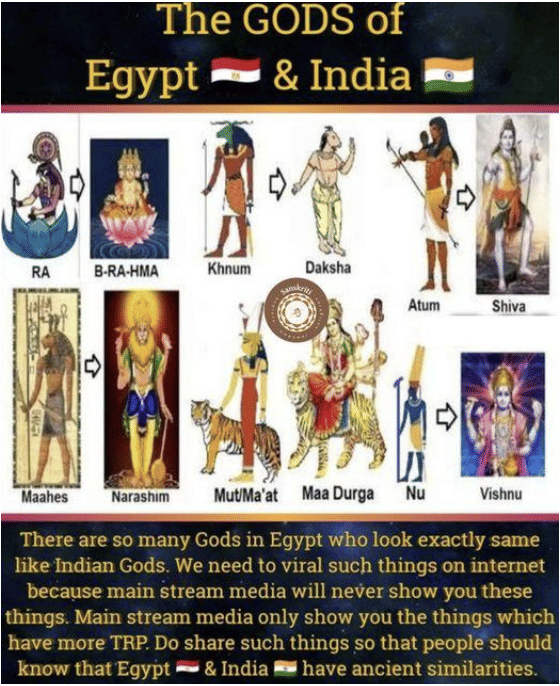Thank you dear subscribers, we are overwhelmed with your response.
Your Turn is a unique section from ThePrint featuring points of view from its subscribers. If you are a subscriber, have a point of view, please send it to us. If not, do subscribe here: https://theprint.in/
In the world of entertainment, actors often adopt stage names or change their names to better fit their roles or to create a more memorable persona. This practice is widely accepted and understood as part of the creative process. For instance, the legendary actor Cary Grant was born Archibald Leach, and the iconic Marilyn Monroe was originally Norma Jeane Mortenson. Similarly, in the roles they portray, actors frequently assume different identities to bring characters to life, adding depth and authenticity to their performances.
This concept of adopting new identities is also explored in popular culture, such as in the “Star Trek” episodes “Who Mourns for Adonais?” and “The Paradise Syndrome.” These episodes delve into themes of identity and transformation, reflecting on how characters navigate their roles and the expectations placed upon them.
In “The Paradise Syndrome,” Captain Kirk loses his memory and is worshipped as a god by a Native American-like tribe on an alien planet. This episode reflects themes of divine visitation and identity, similar to Apollo’s story, in the “Star Trek” episode “Who Mourns for Adonais?”. It explores how advanced beings can be perceived as gods, paralleling myths of the Annunaki and Hindu deities, with real or mythical identities.
In the “Star Trek” episode “Who Mourns for Adonais?”, the crew of the USS Enterprise encounters a powerful being who claims to be the Greek god Apollo. This episode delves into several identity issues, primarily focusing on the nature of Apollo’s identity and the implications of his claims.
Similar themes appear in the stories of the Annunaki, advanced beings worshipped by the Sumerians, and Hindu deities like Shiva. Egyptian mythology also features gods like Ra and Osiris, who some speculate were advanced aliens. These narratives explore the influence of powerful beings on human civilization, suggesting that gods across cultures might have been extraterrestrial visitors who shaped early societies.

However, when it comes to politics, the stakes are much higher. The authenticity of a politician’s identity is crucial for maintaining public trust and ensuring transparency. The practice of adopting or altering names for political gain undermines this trust and raises questions about the integrity of those in power. This issue is not confined to one country but is a global phenomenon, affecting democracies like India and the United States.
In India, the historical narrative includes instances of name changes for various reasons. One notable example is Giasuddin Ghazi, who allegedly renamed himself Gangadhar Neharwala to evade British scrutiny. His son, Motilal, further shortened the name to Nehru, and his granddaughter adopted the surname Gandhi, despite no direct relation to Mahatma Gandhi. These changes, while perhaps understandable in their historical context, have led to confusion and skepticism among the public.
Similarly, in the United States, political figures have also altered their identities. JD Vance, a prominent political figure, adopted the surname Vance only after 2012. This change, while legal, raises questions about the motivations behind such decisions and their impact on voter perception.
In Delhi, the current Chief Minister, Atishi Singh, adopted the surname Marlena, reflecting her Marxist and Leninist beliefs. While personal beliefs and ideologies are a private matter, the adoption of a new surname for political reasons can be seen as an attempt to align with a particular voter base or ideology, rather than a reflection of one’s true identity.
The practice of changing names for marriage or adoption is widely accepted and understood. However, altering one’s identity for political gain is a different matter altogether. It suggests a willingness to manipulate public perception and raises concerns about the authenticity of the politician’s intentions and actions.
In a democratic society, transparency and honesty are fundamental principles. Politicians are elected to serve the public, and their identities should be a reflection of their true selves, not a constructed persona designed to gain votes. The public has a right to know who their leaders truly are, and any attempt to obscure or alter one’s identity for political gain undermines the democratic process.
It is time for politicians to come clean about their identities. Embracing one’s true self, with all its complexities and nuances, is a sign of strength and integrity. It builds trust with the electorate and sets a positive example for future generations of leaders.
Author’s bio: Akshay Sharma is a former Gartner analyst, ex-smartphone CTO, VSMP CTO with clients like the World Bank, Chief Technology Evangelist for an AI/ML firm with major US and Indian Government agencies as clients, and a published author on geopolitical topics. He is also a board member for Somy Ali’s NGO, No More Tears. His views are personal.
These pieces are being published as they have been received – they have not been edited/fact-checked by ThePrint.


